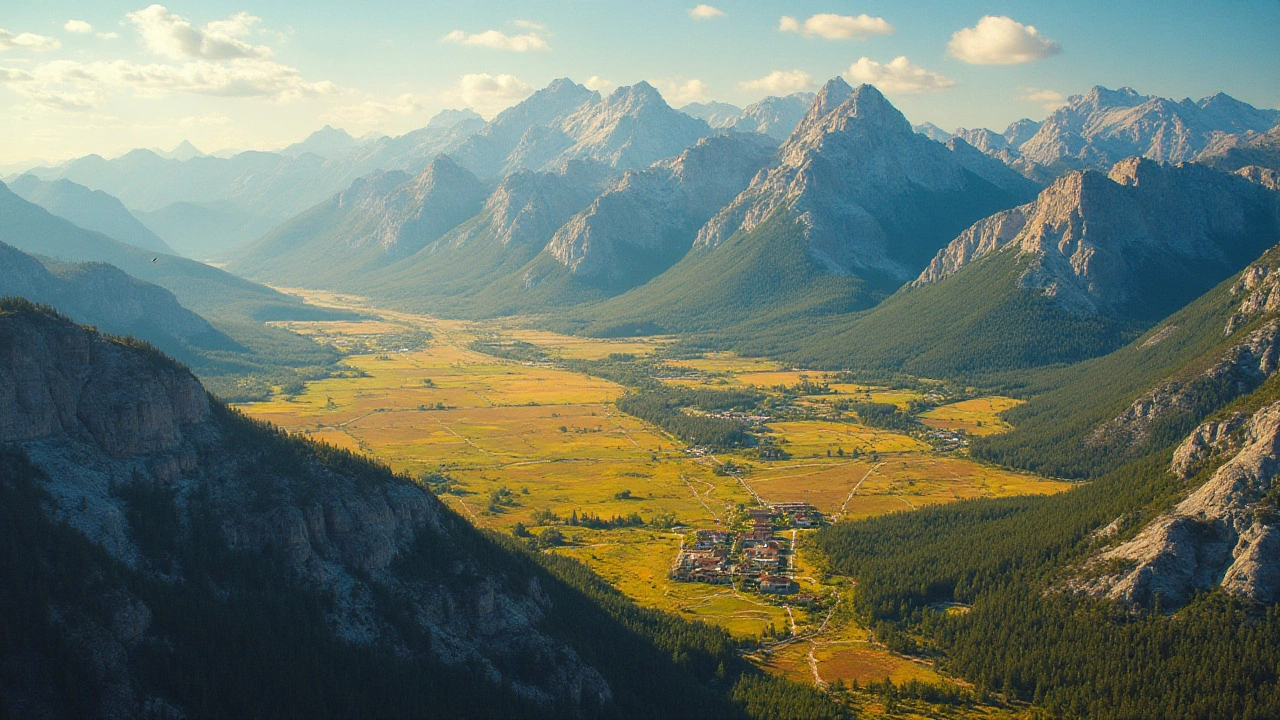The dream of owning a piece of land, a blank canvas upon which to build a vision, is a timeless aspiration. The quest for affordable land across the expansive United States can take you to unexpected places. With varying landscapes, climates, and economies, each state offers a unique opportunity for land buyers.
From the plains of the Midwest to the secluded corners of the South, real estate enthusiasts are continually on the lookout for cost-effective parcels of land. For those ready to invest, understanding where the cheapest land can be found is a crucial step. But, it’s not just about price—it's about potential, purpose, and possibility.
In this narrative, we explore which states offer the most affordable plots and what factors lead to these low prices. Whether you're a first-time buyer or an experienced investor, this guide provides both insight and guidance on securing your own slice of America.
- Understanding Land Value
- Top States for Affordable Land
- Factors Influencing Land Prices
- Pros and Cons of Buying Cheap Land
- Tips for Buying Land on a Budget
Understanding Land Value
The concept of land value is more than just a number. It embodies a mix of tangible and intangible elements that influence how much one is willing to pay for a piece of land. A crucial factor impacting land value is location, which can drastically affect desirability and cost. For example, a plot in the heart of a bustling city will naturally carry a higher price tag compared to a sprawling tract in a remote rural area. Proximity to amenities, transportation hubs, and employment opportunities are components that play significant roles here.
Additionally, the intrinsic qualities of the land itself—like soil fertility, topographical features, and current use—play an important part. Fertile land suitable for agriculture might appeal differently than rocky, undeveloped terrains. Understanding these nuances can help potential buyers gauge the true worth of the land beyond its stated price. Environmental factors, from flood zones to climate, also weigh heavily on valuations. Knowing the potential limitations or advantages presented by nature itself is key to making a well-informed purchase.
Another major factor often overlooked is the local government's influence on land prices through zoning laws and future development plans. Areas designated for commercial use or near upcoming infrastructure projects may see a sudden spike in value. Conversely, multiple regulations or restrictions might deter certain buyers, potentially lowering land value. Here's where staying informed through local councils or real estate experts becomes essential.
Fields, who has served as a consultant in real estate for over two decades, once noted, "Never underestimate the power of future potential—land isn't just about the present circumstances but what it can evolve into under the right conditions." His insights remind us that sometimes, patience and foresight are critical in maximizing the investment made on land.
Given these myriad aspects affecting land value, prospective buyers should engage in thorough research. Comparisons with similar land parcels, considerations of the long-term investment potential, and consultations with local experts often provide a clearer picture of what constitutes good value. At a broad level, understanding these fundamentals can transform a seemingly dull plot into a promising opportunity.
Another consideration emerging in recent years is the socio-economic vibe of a region where the land is located. Rising interest in sustainable living and community-based initiatives has driven certain types of land to become highly desirable. Knowing what appeals to your goals, whether they are financial or lifestyle-oriented, can steer you towards making a choice that is perfectly suited to your aspirations. Remember, land is a finite resource, and recognizing its worth in today's expansive market might just be more lucrative than one can imagine.
Top States for Affordable Land
Searching for cheap land can lead you through some of America's less-traveled paths, where expansive acres rest under vast skies, awaiting new purpose. One might be surprised to discover that the Midwest often tops the list when it comes to affordable land. States like Arkansas, West Virginia, and Mississippi frequently emerge as prime contenders, with low per-acre costs that entice many real estate adventurers. These states, often characterized by their rural tranquility and slower pace, have consistently proven to be nurturing grounds for homesteaders and investors looking for opportunity without the hefty price tag.
Arkansas, known for its lush forests and valleys, offers a serene setting where land is plentiful and affordable. It boasts a rural charm, where rolling hills and clear rivers make up a picturesque landscape. The state has a vibrant agricultural base and a growing community of new settlers embracing off-grid living. Meanwhile, West Virginia, known as 'The Mountain State,' provides a rugged allure with its rich terrain and history of coal mining. Much of its land is untouched, offering a back-to-nature lifestyle that's highly appealing for those seeking seclusion without sacrificing beauty.
On the other hand, Mississippi often ranks high due to its low cost of living and favorable climate for agriculture, making it a practical choice for aspiring farmers and ranchers. With its fertile lands, it's possible to start with a modest investment and gradually build up. Although these areas are primarily rural, the increasingly common work-from-home setups can allow families to thrive while enjoying nature's bounty right at their doorstep.
“The ability to purchase large tracts of land for an affordable price is one of the last frontiers,” says rural land economist Dr. Anderson Bailey. “It's about going where the investment is feasible and the potential is high.”
To paint a comprehensive picture, we can turn to a snapshot comparison of land prices per acre in these intriguing states, measured against the national average. Diverse factors such as zoning laws, future development plans, and regional economic prospects can influence these figures.
| State | Average Price Per Acre |
|---|---|
| Arkansas | $5,000 |
| West Virginia | $4,500 |
| Mississippi | $3,500 |
These averages highlight not just the potential for acquiring land at a reasonable cost but also the chance to engage with communities that value preservation, sustainability, and simplicity. While price alone shouldn't drive your decision, understanding which states offer the most persuasive combinations of cost and quality can guide you toward a purchase that aligns with your objectives in the realm of real estate.

Factors Influencing Land Prices
Understanding why land prices vary across different regions is key to securing cheap land that aligns with your goals. Several elements contribute to the valuation of land, and these factors can either drive prices up or keep them attractively low. One primary factor is location, which remains a critical determinant. Land situated near bustling cities or popular tourist destinations tends to command higher prices due to the increased demand for residential and commercial development. Conversely, parcels positioned in remote or underdeveloped areas often sell for much less, offering budget-conscious buyers a chance to acquire land without breaking the bank.
Infrastructure also plays a crucial role in determining land prices. Access to essential utilities such as water, gas, electricity, and roads can significantly affect a property's value. Land with all these amenities is often priced higher, reflecting the convenience and cost-saving benefits of immediate development potential. Conversely, plots lacking basic infrastructure may be substantially cheaper but require potential buyers to invest further in establishing these services, adding more complexity and cost to the purchase decision.
Economic factors within the state or region can also impact real estate values. States with booming economies generally experience a rise in property prices as both individuals and businesses seek to capitalize on growth opportunities. In contrast, areas experiencing economic downturns might see a decline in land values, presenting opportunities for budget-savvy investors willing to play the long game. Moreover, local government policies regarding zoning, taxes, and land use can greatly influence what buyers are willing to pay. For example, areas with favorable tax incentives or relaxed zoning laws might attract more buyers, driving up land prices over time.
Notably, a report from the United States Department of Agriculture (USDA) highlighted that "land designated for agricultural purposes tends to maintain a steady value due to consistent demand, especially in states with rich farming heritage."
Environmental factors and natural features present another layer of complexity. Proximity to rivers, lakes, or scenic vistas often enhances a lot's appeal and value. However, such benefits come with drawbacks; land in areas prone to natural disasters like floods or wildfires may have reduced appeal due to the perceived risk, impacting its market price. Understanding these dynamics is vital for buyers eager to balance beauty with practicality.
Finally, current market trends also fluctuate, with shifts in demand impacting prices. In recent years, the pandemic has prompted many to reconsider lifestyle choices, leading to increased demand for rural and suburban land. This shift has caused prices to soar in previously overlooked areas. Keeping a pulse on these market trends can provide valuable insights and a timely advantage in securing your desired plot.
Pros and Cons of Buying Cheap Land
There’s an alluring magnetism to the idea of snatching up a parcel of cheap land, the kind of property that promises freedom to do as you please without the crippling cost of more urban locations. The notion of cheap land often brings images of vast stretches under open skies, ideal for those aiming to break away from the urban hustle or those just looking to invest in real estate. However, like every glittering prospect, buying cheap land comes with its own set of challenges and hidden virtues. One of the distinct advantages of purchasing affordable land is the reduced financial strain. Lower costs mean lower risks, and potential buyers can explore opportunities without mortgaging their future. This is particularly appealing to those adopting a more minimalist or self-sufficient lifestyle. The chance to experiment with different agricultural endeavors or to simply hold onto the land as a long-term investment asset can be very rewarding. However, it’s essential to look beyond the price tag and delve into what you are truly getting.
The cons, however, often lurk beneath the surface like icebergs. Cheap land tends to be located in rural or underdeveloped areas. Though these places might charm with their rustic appeal, they often lack essential amenities and infrastructures like reliable road networks, medical facilities, and educational institutions. This lack of accessibility can dramatically affect potential resale value and living quality. There's also the environmental factor—often cheap plots might come with their share of environmental challenges. Whether it’s located in a flood-prone zone or laden with inadequate soil for cultivation, these issues can turn a seemingly good deal into a logistical and financial nightmare. As noted by greenery enthusiast and land investor Robert Aston,
"Cheap land holds mysteries as deep as any tale told on foggy nights—always explore with eyes wide open."It reminds us of the value of thorough research and local familiarity, essential in mitigating risks.
Pros Explained
The beauty of buying land for sale at a lesser cost is the elasticity it offers to the budget. With lower capital commitment, the potential to invest in multiple properties opens up. This can be particularly strategic for those looking to diversify their investment portfolio. With multiple parcels, not only does one increase one’s asset base, but it hedges against any singular market downturn affecting overall land values.- Lower Initial Investment: The initial outlay being minimal means even budding investors can engage in landholding.
- Diverse Investment: Purchasing multiple cheap plots allows better spread across risk horizons.
- Creative Freedom: With fewer constraints compared to urban settings, there is greater freedom to build or explore agrarian activities.
Cons Worth Noting
While the list of pros might eclipse the initial concerns, the cons are not to be underestimated. The infrastructural void that typically accompanies such lands can sometimes shadow any savings made in the price. The difficulty in commuting, poor internet connectivity, and absence of essential services can stagnate growth potential in ways one might not foresee.- Infrastructure Deficit: Essential services like electricity and water may lack, imposing additional costs.
- Lower Resale Potential: Future buyers might refrain due to logistical hindrances.
- Environmental Concerns: Cheaper areas might conceal environmental challenges such as soil erosion or susceptibility to natural disasters.

Tips for Buying Land on a Budget
Purchasing land is a considerable investment, especially when working with a limited budget. One of the first steps is to research extensively on where to find cheap land within your preferred states. Be sure to compare costs across multiple regions, as prices can vary significantly even within the same state. It's important to assess the availability of necessary amenities, such as water, power, and road access, which can affect both the cost and value of the land in the long term. Embracing digital platforms and local real estate networks can help identify potential deals and off-market listings.
Another critical aspect is understanding the zoning laws and potential land use restrictions in your chosen area. Many times, especially in states with affordable land, plots may come with unexpected restrictions on development or use. Public records and local planning departments can offer additional insights into zoning ordinances, ensuring you are well-informed before making a purchase. Consider land surveys as a crucial investment when buying property. These assessments provide precise boundaries and conditions of the land, which are invaluable for potential development.
Engaging with local real estate agents who have a deep understanding of the area can also be beneficial. These professionals can guide you through the legalities and negotiate better deals on your behalf. Remember to account for the hidden costs associated with buying land, such as taxes, insurance, and potential development fees. Be prepared for these expenses in your budget planning. Establishing a relationship with financial institutions can sometimes yield advantageous financing options or grants meant for land purchases.
Look into acquiring land through auctions. Many government entities offer land at lower prices through online or live auctions. However, this route requires a thorough understanding of the auction process and the ability to act quickly, as these deals can disappear fast. Exploring seller financing is another option for those with limited funds. This involves negotiating directly with the seller to pay for the land in installments over time. It's an alternative that provides flexibility without the immediate pressure of full payment.
“The biggest deal of your life may come from the land you purchase,” said real estate expert and author, Jane Smith. “Understanding the intricacies of the land market can turn a modest investment into a profitable venture.”
Finally, patience is key. Finding the right piece of land at the right price often takes time and persistence. Don’t rush into a purchase without thoroughly vetting all aspects of the potential investment. With careful research, understanding of the market, and wise financial strategies, acquiring land for sale on a budget becomes entirely feasible. Stay informed, be adaptable, and you will find a rewarding purchase that aligns with your aspirations.

